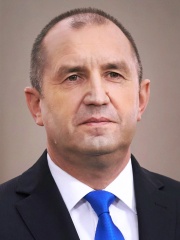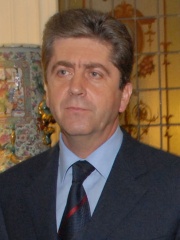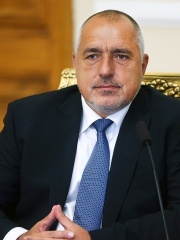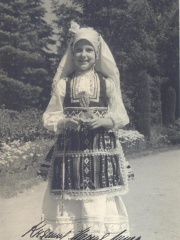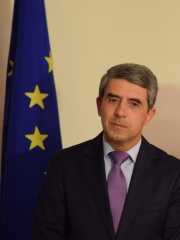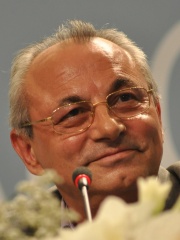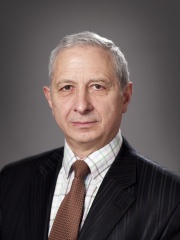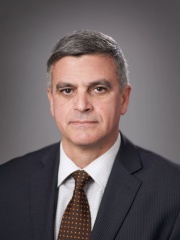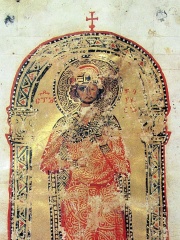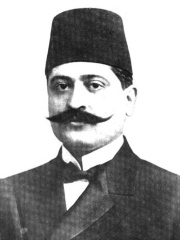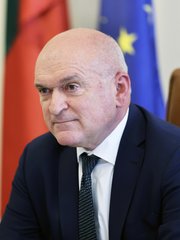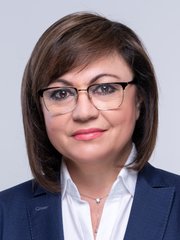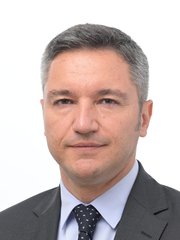
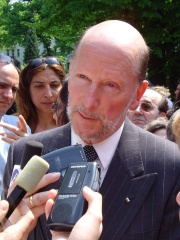
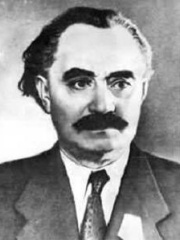
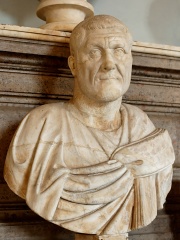
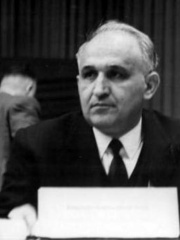
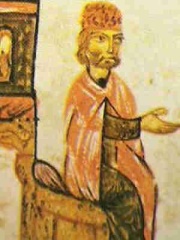
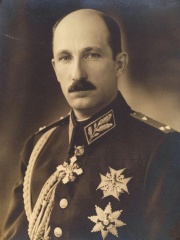
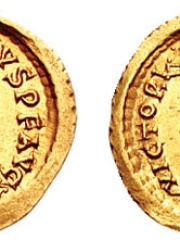
The Most Famous
POLITICIANS from Bulgaria
This page contains a list of the greatest Bulgarian Politicians. The pantheon dataset contains 19,576 Politicians, 122 of which were born in Bulgaria. This makes Bulgaria the birth place of the 31st most number of Politicians behind Israel, and South Korea.
Top 10
The following people are considered by Pantheon to be the top 10 most legendary Bulgarian Politicians of all time. This list of famous Bulgarian Politicians is sorted by HPI (Historical Popularity Index), a metric that aggregates information on a biography's online popularity. Visit the rankings page to view the entire list of Bulgarian Politicians.

1. Ahmed III (1673 - 1736)
With an HPI of 79.71, Ahmed III is the most famous Bulgarian Politician. His biography has been translated into 69 different languages on wikipedia.
Ahmed III (Ottoman Turkish: احمد ثالث, Aḥmed-i sālis; Turkish: III. Ahmed; 30 December 1673 – 1 July 1736) was sultan of the Ottoman Empire and a son of sultan Mehmed IV (r. 1648–1687). His mother was Gülnuş Sultan, originally named Evmania Voria, who was an ethnic Greek. He was born at Hacıoğlu Pazarcık, in Dobruja. He succeeded to the throne in 1703 on the abdication of his brother Mustafa II (1695–1703). Nevşehirli Damat İbrahim Pasha and the Sultan's daughter, Fatma Sultan (wife of the former) directed the government from 1718 to 1730, a period referred to as the Tulip Era. During the initial days of Ahmed III's reign, significant efforts were made to appease the janissaries. However, Ahmed's effectiveness in dealing with the janissaries who had elevated him to the sultanate was limited. Grand Vizier Çorlulu Ali Pasha, whom Ahmed appointed, provided valuable assistance in administrative affairs and implemented new measures for the treasury. He supported Ahmed in his struggles against rival factions and provided stability to the government. Ahmed was an avid reader, skilled in calligraphy and knowledgeable on history and poetry.

2. Simeon Saxe-Coburg-Gotha (b. 1937)
With an HPI of 79.05, Simeon Saxe-Coburg-Gotha is the 2nd most famous Bulgarian Politician. His biography has been translated into 58 different languages.
Simeon Borisov Saxe-Coburg-Gotha (Bulgarian: Симеон Борисов Сакскобургготски, romanized: Simeon Borisov Sakskoburggotski, [simeˈɔn boˈrisof sakskoburˈɡɔtski]; born 16 June 1937) is a Bulgarian politician who reigned as the last Tsar of the Tsardom of Bulgaria as Simeon II from 1943 until 1946. In 1946, the monarchy was abolished by a referendum, forcing Simeon into exile. Following the fall of communism in Bulgaria, Simeon returned to his home country in 1996, and founded the National Movement for Stability and Progress party (also known as the National Movement Simeon II party). After winning the 2001 election as its leader, Simeon proceeded to govern Bulgaria as prime minister of the Republic of Bulgaria from 2001 to 2005. Simeon was six years old when his father Boris III of Bulgaria died in 1943. Royal power was exercised on his behalf by a regency council led by Simeon's uncle Kiril, Prince of Preslav, General Nikola Mihov and prime minister, Bogdan Filov. Following his premiership from 2001 to 2005, in the next election, as leader of NDSV, Simeon entered a coalition government with the Bulgarian Socialist Party, as his party finished second in the election. In 2009, after NDSV failed to win any seats in the National Assembly, he retired from politics. As of 2026, Simeon is one of only two living men who were heads of state during World War II, along with the 14th Dalai Lama, although both held only mostly symbolic roles in their respective governments.

3. Georgi Dimitrov (1882 - 1949)
With an HPI of 77.41, Georgi Dimitrov is the 3rd most famous Bulgarian Politician. His biography has been translated into 56 different languages.
Georgi Dimitrov Mihaylov (; Bulgarian: Георги Димитров Михайлов) also known as Georgiy Mihaylovich Dimitrov (Russian: Георгий Михайлович Димитров; 18 June 1882 – 2 July 1949), was a Bulgarian communist politician who served as General Secretary of the Central Committee of the Bulgarian Communist Party from 1933 to 1949, and the first leader of the Communist People's Republic of Bulgaria from 1946 to 1949. From 1935 to 1943, he was the General Secretary of the Communist International. Born in western Bulgaria, Dimitrov worked as a printer and trade unionist during his youth. He was elected to the Bulgarian parliament as a socialist during the First World War and campaigned against his country's involvement in the conflict, which led to his brief imprisonment for sedition. In 1919, he helped found the Bulgarian Communist Party. Two years later, he moved to the Soviet Union and was elected to the executive committee of Profintern. In 1923, Dimitrov led a failed communist uprising against the government of Aleksandar Tsankov and was subsequently forced into exile. He lived in the Soviet Union until 1929, at which time he relocated to Germany and became head of the Comintern operations in central Europe. Dimitrov rose to international prominence in the aftermath of the 1933 Reichstag fire trial. Accused of plotting the arson, he refused counsel and mounted an eloquent defence against his Nazi accusers, in particular Hermann Göring, ultimately winning acquittal. After the trial, he relocated to Moscow and was elected head of Comintern. In 1946, Dimitrov returned to Bulgaria after 22 years in exile and was elected prime minister of the newly founded People's Republic of Bulgaria. He negotiated with Josip Broz Tito to create a federation of Southern Slavs, which led to the 1947 Bled accord. The plan ultimately fell apart over differences regarding the future of the joint country as well as the Macedonian question, and was completely abandoned following the fallout between Stalin and Tito. Dimitrov died after a short illness in 1949 in Barvikha near Moscow. His embalmed body was housed in the Georgi Dimitrov Mausoleum in Sofia until its removal in 1990; the mausoleum was demolished in 1999.

4. Maximinus Thrax (173 - 238)
With an HPI of 77.29, Maximinus Thrax is the 4th most famous Bulgarian Politician. His biography has been translated into 70 different languages.
Gaius Julius Verus Maximinus "Thrax" (c. 173 – 238, also spelled as Maximin in some English modern texts) was a Roman emperor from 235 to 238. Born of Thracian origin – given the nickname Thrax ("the Thracian") – he rose up through the military ranks, ultimately holding high command in the army of the Rhine under Emperor Severus Alexander. After Severus was murdered in 235, Maximinus was proclaimed emperor by the army, beginning the Crisis of the Third Century, a 50-year period of instability and civil war. He is often remembered for his unusual height, although the veracity of this is disputed. Maximinus was the commander of the Legio IV Italica when Severus Alexander was assassinated by his own troops in 235. The Pannonian army then elected Maximinus emperor. In 238 (which came to be known as the Year of the Six Emperors), a senatorial revolt broke out, leading to the successive proclamation of Gordian I, Gordian II, Pupienus, Balbinus, and Gordian III as emperors in opposition to Maximinus. Maximinus advanced on Rome to put down the revolt, but was halted at Aquileia, where he was assassinated by disaffected elements of the Legio II Parthica. Maximinus is described by several ancient sources, though only Herodian's Roman History is contemporary. He was a so-called barracks emperor of the 3rd century; his rule is often considered to mark the beginning of the Crisis of the Third Century. Maximinus was the first emperor who hailed neither from the senatorial class nor from the equestrian class.
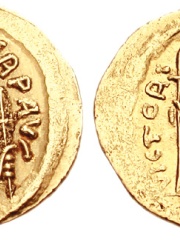
5. Phocas (547 - 610)
With an HPI of 75.93, Phocas is the 5th most famous Bulgarian Politician. His biography has been translated into 58 different languages.
Phocas (Latin: Focas; Ancient Greek: Φωκάς, romanized: Phōkás; 547 – 5 October 610) was Eastern Roman emperor from 602 to 610. Initially a middle-ranking officer in the Roman army, Phocas rose to prominence as a spokesman for dissatisfied soldiers in their disputes with the court of the Emperor Maurice. When the army rebelled in 602, Phocas emerged as the leader of the mutiny. The revolt led to the overthrow and execution of Maurice in November 602. Phocas deeply mistrusted the uncooperative elite of Constantinople, to whom he was a usurper and a provincial boor. He therefore attempted to base his regime on relatives installed in high military and administrative positions. He immediately faced challenges in domestic and foreign affairs, and responded with little success. He dealt with domestic opposition with increasing ruthlessness that alienated ever wider circles, including some of his own household. The Sasanian Empire launched a massive invasion of the eastern provinces. Finally, the exarch of Africa, Heraclius the Elder, rebelled against Phocas and gained wide support throughout the empire. Phocas attempted to use border troops to crush the rebellion, but this only resulted in allowing invaders to break into the heartlands of the Empire. Heraclius the Elder's son, Heraclius, took Constantinople on 5 October 610, executed Phocas the same day, and declared himself emperor. Surviving sources are universally extremely hostile to Phocas. He is described as an incompetent tyrant and usurper who brutally purged any real or perceived opposition and left the Empire wide open to foreign aggression. The veracity of these sources is difficult to ascertain since emperors of the Heraclian dynasty who succeeded Phocas had a vested interest in tarnishing his reputation.

6. Todor Zhivkov (1911 - 1998)
With an HPI of 75.86, Todor Zhivkov is the 6th most famous Bulgarian Politician. His biography has been translated into 59 different languages.
Todor Hristov Zhivkov (Bulgarian: Тодор Христов Живков [ˈtɔdor ˈxristof ˈʒifkof]; 7 September 1911 – 5 August 1998) was a Bulgarian communist statesman who served as the de facto leader of the People's Republic of Bulgaria (PRB) from 1954 until 1989 as General Secretary of the Central Committee of the Bulgarian Communist Party. He was the second longest-serving leader in the Eastern Bloc, the longest-serving leader within the Warsaw Pact and the longest-serving non-royal ruler in Bulgarian history. During World War II, Zhivkov participated in Bulgaria's resistance movement in the People's Liberation Insurgent Army. In 1943, he was involved in organising the Chavdar Partisan Brigade in and around his place of birth, becoming deputy commander of the Sofia operations area in the summer of 1944. Under his rule, many fellow former combatants with Chavdar were to rise to positions of prominence in Bulgarian affairs. He is said to have coordinated partisan movements with those of pro-Soviet army units during the 9 September 1944 uprising. He became First Secretary of the Bulgarian Communist Party (BCP) in 1954 (General Secretary from April 1981), served as Prime Minister from 1962 to 1971 and from 1971 onwards as Chairman of the State Council, concurrently with his post as First Secretary. He remained in these positions for 35 years, until 1989, thus becoming the longest-serving leader of any European Eastern Bloc nation after World War II, and one of the longest ruling non-royal leaders in modern history. His rule marked a period of unprecedented political and economic stability for Bulgaria, marked both by complete submission of Bulgaria to the Soviet Union and a desire to expand ties with the West. His rule remained unchallenged until the deterioration of East–West relations in the 1980s, when a stagnating economic situation, a worsening international image and growing careerism and corruption in the BCP weakened his position. He resigned on 10 November 1989, under pressure by senior BCP members due to his refusal to recognise problems and deal with public protests. Within a month of Zhivkov's ousting, communist rule in Bulgaria had effectively ended, and within a year the People's Republic of Bulgaria had formally ceased to exist.

7. Simeon I of Bulgaria (864 - 927)
With an HPI of 75.79, Simeon I of Bulgaria is the 7th most famous Bulgarian Politician. His biography has been translated into 59 different languages.
Simeon I the Great (Church Slavonic: цѣсар҄ь Сѷмеѡ́нъ А҃ Вели́къ; Bulgarian: цар Симеон I Велики, romanized: Simeon I Veliki [simɛˈɔn ˈpɤrvi vɛˈliki]; Greek: Συμεών Αʹ ὁ Μέγας, romanized: Sumeṓn prôtos ho Mégas) was the ruler of the First Bulgarian Empire from 893 until his death in 927. Simeon's successful campaigns against the Byzantines, Magyars and Serbs led Bulgaria to its greatest territorial expansion ever, making it the most powerful state in contemporary Eastern and Southeast Europe. His reign was also a period of unmatched cultural prosperity and enlightenment later deemed the Golden Age of Bulgarian culture. During Simeon's rule, Bulgaria spread over a territory between the Aegean, the Adriatic and the Black seas. The newly independent Bulgarian Orthodox Church became the first new patriarchate besides the Pentarchy, and Bulgarian Glagolitic and Cyrillic translations of Christian texts spread all over the Slavic world of the time. It was at the Preslav Literary School in the 890s that the Cyrillic alphabet was developed. Halfway through his reign, Simeon assumed the title of "emperor" (Tsar), having prior to that been styled "prince" (Knyaz).

8. Boris III of Bulgaria (1894 - 1943)
With an HPI of 75.47, Boris III of Bulgaria is the 8th most famous Bulgarian Politician. His biography has been translated into 51 different languages.
Boris III (Bulgarian: Борѝс III; Boris Treti; 30 January [O.S. 18 January] 1894 – 28 August 1943) was the Tsar of the Kingdom of Bulgaria from 1918 until his death in 1943. The eldest son of Ferdinand I, Boris assumed the throne upon the abdication of his father in the wake of Bulgaria's defeat in World War I. Under the 1919 Treaty of Neuilly, Bulgaria was forced to cede various territories, pay crippling war reparations, and greatly reduce the size of its military. That same year, Aleksandar Stamboliyski of the Bulgarian Agrarian National Union became prime minister. After Stamboliyski was overthrown in a coup in 1923, Boris recognized the new government of Aleksandar Tsankov, who harshly suppressed the Bulgarian Communist Party and led the nation through a brief border war with Greece. Tsankov was removed from power in 1926, and a series of prime ministers followed until 1934, when the corporatist Zveno (Bulgarian: Звено) movement staged a coup and outlawed all political parties. Boris opposed the Zveno government and overthrew them in 1935, eventually installing Georgi Kyoseivanov as prime minister. For the remainder of his reign, Boris would rule as a de facto absolute monarch, with his prime ministers largely submitting to his will. Following the outbreak of World War II, Bulgaria initially remained neutral. In 1940, Nazi sympathizer Bogdan Filov replaced Kyoseivanov as prime minister, becoming the last prime minister to serve under Boris. In September 1940, with the support of Nazi Germany, Bulgaria received the region of Southern Dobrudja from Romania as part of the Treaty of Craiova. In January 1941, Boris approved the anti-Semitic Law for Protection of the Nation, which denied citizenship to Bulgarian Jews and placed numerous restrictions upon them. In March 1941, Bulgaria joined the Axis and allowed German troops to use Bulgaria as a base from which to invade Yugoslavia and Greece. Bulgaria then received large portions of Yugoslav Macedonia, Pirot County in eastern Serbia and Greek Thrace, which were key targets of Bulgarian irredentism. Bulgaria opted out of participation in the German invasion of the Soviet Union, as allowed by the provisions of the Axis alliance. As part of the Holocaust, Bulgarian authorities deported most Jews from occupied Greek and Yugoslav territories and transferred them to the German extermination camp of Treblinka. Under public pressure, Boris cancelled the deportation of Bulgarian Jews while expelling almost 20,000 Jews to the Bulgarian countryside to be deployed in forced labour camps. In 1942, Zveno, the Agrarian National Union, the Bulgarian Communist Party, and other far-left groups united to form a resistance movement known as the Fatherland Front, which went on to overthrow the government in 1944. In August 1943, shortly after returning from a visit to Germany, Boris died at the age of 49. Following his death, he was succeeded as Tsar by his six-year-old son, Simeon Borisov Saxe-Coburg-Gotha (Bulgarian: Симеон Борисов Сакскобургготски), who ascended the throne under the regnal name Simeon II.

9. Marcian (396 - 457)
With an HPI of 75.07, Marcian is the 9th most famous Bulgarian Politician. His biography has been translated into 59 different languages.
Marcian (; Latin: Marcianus; Ancient Greek: Μαρκιανός Markianos; c. 392 – 27 January 457) was Roman emperor of the East from 450 to 457. Very little is known of his life before becoming emperor, other than that he was a domesticus (personal assistant) who served under the commanders Ardabur and his son Aspar for fifteen years. After the death of Emperor Theodosius II on 28 July 450, Marcian was made a candidate for the throne by Aspar, who held much influence because of his military power. After a month of negotiations Pulcheria, Theodosius' sister, agreed to marry Marcian. Zeno, a military leader whose influence was similar to Aspar's, may have been involved in these negotiations, as he was given the high-ranking court title of patrician upon Marcian's accession. Marcian was elected and inaugurated on 25 August 450. Marcian reversed many of the actions of Theodosius II in the Eastern Roman Empire's relationship with the Huns under Attila and in religious matters. Marcian almost immediately revoked all treaties with Attila, ending all subsidy payments to him. In 452, while Attila was raiding Roman Italy, then a part of the Western Roman Empire, Marcian launched expeditions across the Danube into the Great Hungarian Plain, defeating the Huns in their own heartland. This action, accompanied by the famine and plague that broke out in northern Italy, allowed the Western Roman Empire to bribe Attila into retreating from the Italian peninsula. After Attila's death in 453, Marcian took advantage of the resulting fragmentation of the Hunnic confederation by settling Germanic tribes within Roman lands as foederati ("federates" providing military service in exchange for benefits). Marcian also convened the Council of Chalcedon, which declared that Jesus had two "natures": divine and human. This led to the alienation of the population of the eastern provinces of Syria and Egypt, as many of them were miaphysites, rejecting the new official Christology. Marcian died on 27 January 457, leaving the Eastern Roman Empire with a treasury surplus of seven million solidi coins, an impressive achievement considering the economic ruin inflicted upon the Eastern Roman Empire by the Huns and Theodosius' tribute payments. After his death, Aspar passed over Marcian's son-in-law, Anthemius, and had a military commander, Leo I, elected as emperor.
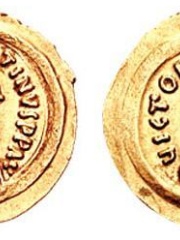
10. Tiberius II Constantine (520 - 582)
With an HPI of 73.60, Tiberius II Constantine is the 10th most famous Bulgarian Politician. His biography has been translated into 56 different languages.
Tiberius II Constantine (Latin: Tiberius Cōnstantīnus; Ancient Greek: Τιβέριος Κωνσταντῖνος, romanized: Tibérios Kōnstantĩnos; died 14 August 582) was Eastern Roman emperor from 574 to 582. Tiberius rose to power in 574 when Justin II, during an abatement in a period of severe mental illness, proclaimed him caesar and adopted him as his own son. In 578, the dying Justin II gave him the title of augustus, thus making Tiberius co-emperor alongside him. Tiberius became sole ruler less than two weeks later, assuming the regnal name of "Constantine" under which he reigned until his death.
People
Pantheon has 122 people classified as Bulgarian politicians born between 470 BC and 1982. Of these 122, 33 (27.05%) of them are still alive today. The most famous living Bulgarian politicians include Simeon Saxe-Coburg-Gotha, Rumen Radev, and Georgi Parvanov. The most famous deceased Bulgarian politicians include Ahmed III, Georgi Dimitrov, and Maximinus Thrax. As of April 2024, 5 new Bulgarian politicians have been added to Pantheon including Rosen Zhelyazkov, Dimitar Glavchev, and Korneliya Ninova.
Living Bulgarian Politicians
Go to all RankingsSimeon Saxe-Coburg-Gotha
1937 - Present
HPI: 79.05
Rumen Radev
1963 - Present
HPI: 68.58
Georgi Parvanov
1957 - Present
HPI: 66.25
Boyko Borisov
1959 - Present
HPI: 65.61
Petar Stoyanov
1952 - Present
HPI: 63.74
Princess Marie Louise of Bulgaria
1933 - Present
HPI: 63.35
Rosen Plevneliev
1964 - Present
HPI: 61.97
Ahmed Dogan
1954 - Present
HPI: 59.82
Ognyan Gerdzhikov
1946 - Present
HPI: 58.97
Nikolai Denkov
1962 - Present
HPI: 58.51
Rosen Zhelyazkov
1968 - Present
HPI: 57.92
Stefan Yanev
1960 - Present
HPI: 55.42
Deceased Bulgarian Politicians
Go to all RankingsAhmed III
1673 - 1736
HPI: 79.71
Georgi Dimitrov
1882 - 1949
HPI: 77.41
Maximinus Thrax
173 - 238
HPI: 77.29
Phocas
547 - 610
HPI: 75.93
Todor Zhivkov
1911 - 1998
HPI: 75.86
Simeon I of Bulgaria
864 - 927
HPI: 75.79
Boris III of Bulgaria
1894 - 1943
HPI: 75.47
Marcian
396 - 457
HPI: 75.07
Tiberius II Constantine
520 - 582
HPI: 73.60
Boris I of Bulgaria
828 - 907
HPI: 72.71
Talaat Pasha
1874 - 1921
HPI: 72.49
Kubrat
605 - 665
HPI: 71.82
Newly Added Bulgarian Politicians (2025)
Go to all RankingsRosen Zhelyazkov
1968 - Present
HPI: 57.92
Dimitar Glavchev
1963 - Present
HPI: 53.48
Korneliya Ninova
1969 - Present
HPI: 44.88
Kristian Vigenin
1975 - Present
HPI: 39.74
Boris Georgiev
1982 - Present
HPI: 37.43
Overlapping Lives
Which Politicians were alive at the same time? This visualization shows the lifespans of the 25 most globally memorable Politicians since 1700.

